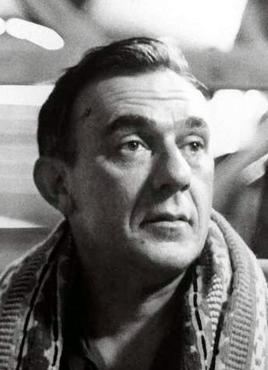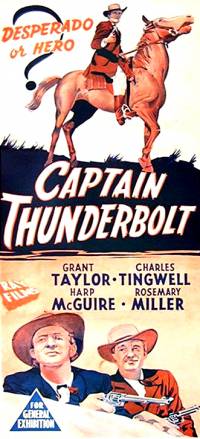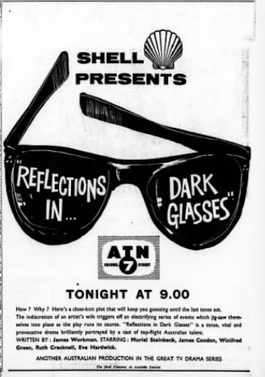Related Research Articles
Bill Bain was an Australian television and film director.

Robert Bruning was an Australian actor and film producer, who was the founder of film production firm Gemini Productions
Ken Hannam was an Australian film and television director who also worked in British television drama.

Captain Thunderbolt is a 1953 Australian action film from director Cecil Holmes about the bushranger Captain Thunderbolt. It was one of the few all-Australian films of the 1950s.
Is There Anybody There? is a 1976 Australian TV movie directed by Peter Maxwell and produced by Robert Bruning. It has been called the first colour tele movie made in Australia and its success led to Bruning being commissioned to make a series of TV movies, including The Newman Shame which also starred Lazenby.
The Newman Shame is a 1977 Australian television film starring George Lazenby and produced by Robert Bruning who previously worked together on Is There Anybody There? (1976). Bruning made it for his Gemini Productions, which was owned by Reg Grundy Productions.

Shell Presents was an early attempt at Australian television drama, being an umbrella title for several different productions. It debuted on 4 April 1959, and aired on ATN-7 and GTV-9, who split production of plays for the series between them. It was an anthology series, each program being a self-contained play for television. The series won a Logie award in 1960 for TV Highlight of 1959. As the title suggests, it was sponsored by Shell. It was described as "a very big deal for the station: major institutional sponsorship from international companies for locally produced drama." It would be followed by The General Motors Hour.
The Alternative is a 1978 Australian television film about an unmarried editor of a woman's magazine who finds herself pregnant. She has a relationship with another woman.
Gone to Ground is a 1977 Australian TV movie about a man pursued by a killer.
Image of Death is a 1978 Australian TV movie about a woman who likes to live off other people's money.
Mama's Gone A-Hunting is a 1977 Australian television film. The title is taken from the English nursery rhyme and lullaby, Bye, baby Bunting. The film featured many well known Australian actors of the period, including Gerard Kennedy, Carmen Duncan, and starred Judy Morris
The Night Nurse is a 1978 Australian television film about the relationship between a former opera star and her night nurse.

"Reflections in Dark Glasses" is an Australian television film, or rather a television play, which aired in 1960. It aired as part of Shell Presents, which consisted of monthly presentations of stand-alone television dramas. It was written by Sydney writer James Workman, and is notable as an early example of Australian-written television drama. It was broadcast live in Sydney on 6 February 1960, then recorded and shown in Melbourne.
Dark Brown is an early Australian television film, broadcast during 1957 on ABC.

"Pardon Miss Westcott" is a 1959 Australian TV play by the Seven Network as part of drama anthology series Shell Presents. It was a musical set in colonial Australia and was broadcast live. It was Australia's first television musical comedy. "Pardon Miss Westcott" aired on 12 December 1959 in Sydney and on 19 December 1959 in Melbourne.

"Ruth" is a 1959 Australian television play. It was presented as part of the Shell Presents program and starred Lyndall Barbour. It was written by John Glennon, an American actor and writer who appeared in the production, and directed by Rod Kinnear. The play aired in Melbourne on 5 September 1959 and in Sydney on 19 September 1959.
Paradise is a 1975 Australian TV movie produced by Robert Bruning and directed by Bill Hughes.
Seagulls Over Sorrento is a 1960 Australian television play. It was based on the popular stage play Seagulls Over Sorrento and was produced by Crawford Productions for Melbourne's HSV-7, airing on 1 May 1960 as an episode of "ACI Theatre". It screened on TCN-9 in Sydney on Sunday 12 June.
The Slaughter of St. Teresa's Day was a 1960 Australian TV play based on the stage play of the same name by Peter Kenna.

The Devil Makes Sunday is a 1962 Australian television play by New Zealand-born author Bruce Stewart. It was broadcast live from Melbourne, and taped and shown in other cities at a later date.
References
- 1 2 Ed. Scott Murray, Australia on the Small Screen 1970-1995, Oxford Uni Press, 1996 p42
- ↑ "Movies on TV". Sydney Morning Herald. 17 June 1979. p. 53.
- ↑ "TV Guide". The Age. 21 May 1980. p. 2.
- 1 2 Vagg, Stephen (31 December 2019). "Top Ten Australian James Bond Homages". Filmink.
- ↑ Beilby, Peter; Murray, Scott (September–October 1979). "Robert Bruning". Cinema Papers. pp. 517–519.
- 1 2 "Kevin Dobson". Cinema Papers. February 1982. p. 17.
- ↑ "Short Takes". Sydney Morning Herald. 13 November 1977. p. 83.
- ↑ Neil, Kristine (18 June 1979). "One With all the Cliches". Sydney Morning Herald. p. 29.